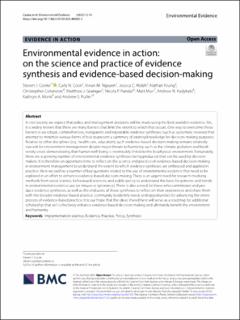| dc.description.abstract | In civil society we expect that policy and management decisions will be made using the best available evidence. Yet, it is widely known that there are many barriers that limit the extent to which that occurs. One way to overcome these barriers is via robust, comprehensive, transparent and repeatable evidence syntheses (such as systematic reviews) that attempt to minimize various forms of bias to present a summary of existing knowledge for decision-making purposes. Relative to other disciplines (e.g., health care, education), such evidence-based decision-making remains relatively nascent for environment management despite major threats to humanity, such as the climate, pollution and biodiversity crises demonstrating that human well-being is inextricably linked to the biophysical environment. Fortunately, there are a growing number of environmental evidence syntheses being produced that can be used by decision makers. It is therefore an opportune time to refect on the science and practice of evidence-based decision-making in environment management to understand the extent to which evidence syntheses are embraced and applied in practice. Here we outline a number of key questions related to the use of environmental evidence that need to be explored in an efort to enhance evidence-based decision-making. There is an urgent need for research involving methods from social science, behavioural sciences, and public policy to understand the basis for patterns and trends in environmental evidence use (or misuse or ignorance). There is also a need for those who commission and produce evidence syntheses, as well as the end users of these syntheses to refect on their experiences and share them with the broader evidence-based practice community to identify needs and opportunities for advancing the entire process of evidence-based practice. It is our hope that the ideas shared here will serve as a roadmap for additional scholarship that will collectively enhance evidence-based decision-making and ultimately beneft the environment and humanity. Implementation science, Evidence, Practice, Policy, Synthesis | en_US |

